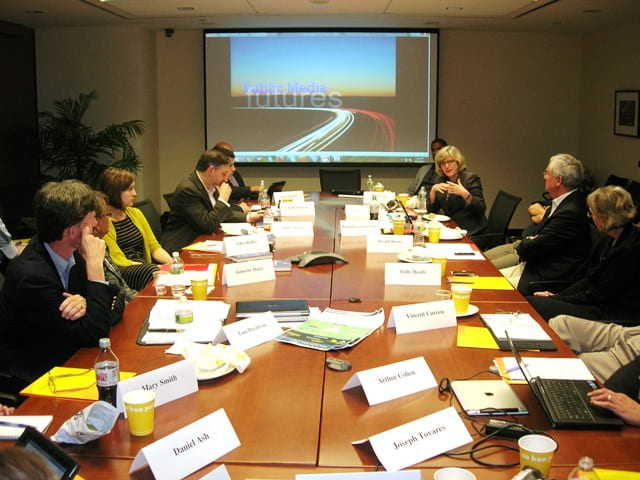 WASHINGTON – Senior managers in U.S. public media and millennial junior staff members share almost identical visions of the transition from broadcasting to digital platforms over the next ten years, according to a new survey presented at today’s CCLP forum here. But the same survey shows more than 40% of the younger staff members are not confident that senior managers know what they are doing in digital media.
WASHINGTON – Senior managers in U.S. public media and millennial junior staff members share almost identical visions of the transition from broadcasting to digital platforms over the next ten years, according to a new survey presented at today’s CCLP forum here. But the same survey shows more than 40% of the younger staff members are not confident that senior managers know what they are doing in digital media.
The senior managers and junior staff were very close in their projections of the shift from broadcasting in 2013 to digital in 2023, “within a few percentage points” according to Mark Fuerst, Director of Strategic Initiatives at Current, which will publish the complete survey. (And you can see many of the results in the slide show here: Fuerst ppt FINAL.pdf.
But while senior managers judged themselves competent to manage digital media platforms by a margin of 69% to 9%, millennials were more skeptical: Asked whether their senior management was competent to manage digital media, millennials split evenly, 41% to 41% (see slide 43 of Fuerst’s presentation).
Fuerst said some millennials were even uncomfortable taking the survey in their stations, preferring to participate from outside the office.
But PBS can already build on success, according to Tom Davidson, Senior Director of PBS Digital, who said more people visited PBS.org in April than any other broadcast web site. He also said PBSKids.org has been the most popular children’s video web site for over a year. View the full PBS power point presentation by clicking through to following link: Davidson PBS ppt.pdf
Mark Stencel, Managing Editor for NPR Digital News, said the future of public media would increasingly value connecting with the people formerly called the audience. And he showed a picture of a typewriter used by longtime Washington Post political columnist David Broder, for two reasons: Stencel’s first job at the Post was to change Broder’s typewriter ribbon. But more important, said Stencel, was that Broder insisted on using that typewriter to reply, personally and individually, to each reader who sent him a letter. That is the spirit, according to Stencel, that must be embraced by public media. For the full presentation click through to the following link: Stencel NPR ppt.pdf
The forum was webcast live, and viewers sent numerous questions and comments. One asked for examples of stations that are examples of successful future-oriented management; forum participants around the table quickly named a dozen, including WNYC in New York, St. Louis public radio, Nashville public television, KPCC-FM in Los Angeles and WBEZ in Chicago
One of those stations was represented at the forum: Daniel Ash, Vice President of Strategic Communications at WBEZ Chicago Public Media described one innovation his station has launched to connect with the communities it serves. Dubbed Curious City, the initiative asks listeners to suggest stories the station should investigate – and then pairs them with the reporter assigned to pursue the investigation.
But public media looking for the key to better management may be ignoring one enormous asset they have had for decades. Vincent Curren, Executive Vice President of the Corporation for Public Broadcasting, noted that a majority of public radio stations and a quarter of public TV stations are owned by universities, many of which have business schools that teach… management.
Today’s forum was presented in partnership with American University’s School of Communication and Current, which will report on today’s forum in detail.